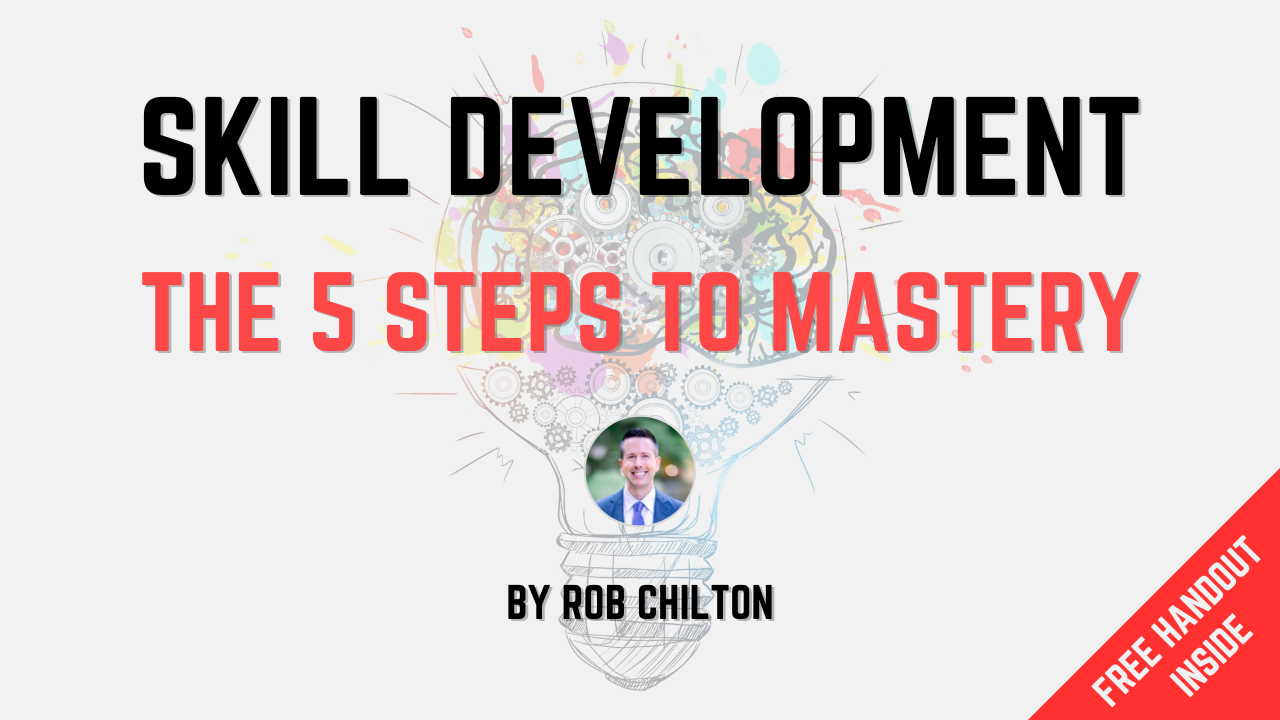Competition: Transcending the Win/Loss Mentality
Nov 01, 2023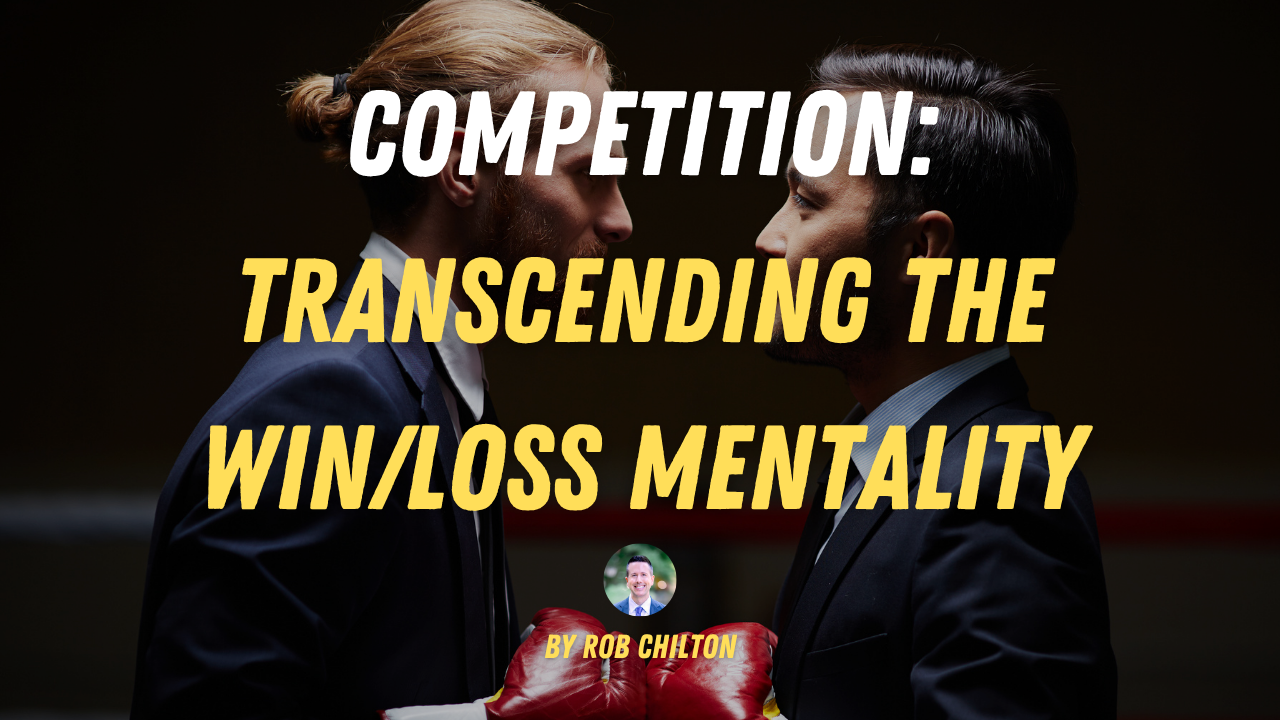
Estimated Read Time: 7 minutes
By Rob Chilton
Competition.
In music education, this word alone elicits polarized reactions. Whether you embrace or avoid it, the fact remains—it exists. As educators, we face the challenging task of understanding our own feelings about competition while also guiding students through it.
Like many teachers, my perspective has evolved over the years. Early in my career, I saw competition as a motivator. Now, I view it as a tool—one that can either inspire or distort growth, depending on how we use it. My goal here is to offer a reflection on how we can approach competition with a healthy and balanced mindset.
What is Competition?
By definition, competition occurs when two or more parties strive for a common goal that can’t often be shared—where one’s gain often means another’s loss. In nature, animals compete for food, water, and resources. Humans do too, though when our essential needs are met, competition often shifts toward recognition, status, and achievement.
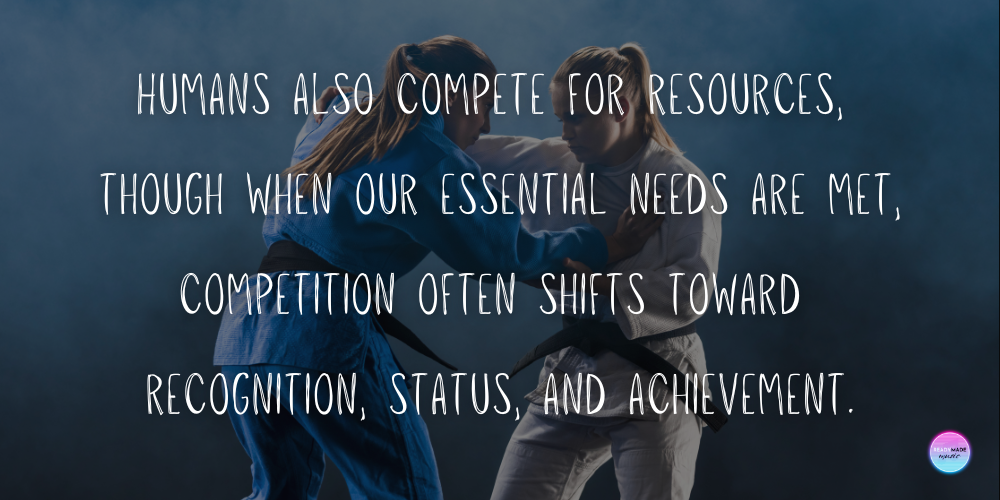
Reasons for Competition
Psychologists Robert E. Franken and Douglas E. Brown outlined three common reasons people compete:
- To satisfy their need to win
- To provide motivation for improvement
- To push themselves to produce greater effort
In music education, we commonly hear the following:
- Competition is fun
- Sports do it—so should we
- Life is competition—we must prepare our students
While there’s truth in all of these, I believe the most balanced reasons are those rooted in the growth, such as:
- Helping us measure progress
- Teaching goal-setting and planning
- Building emotional resilience
In my opinion, if we’re going to compete in music—and we often have some local or independent choice in how much we do—it’s essential that we teach our students to navigate it, not just participate in it.
The Seven Steps for Growth through Competition
We can turn every competitive cycle into a well-rounded learning experience with a seven-step process I use with my students.
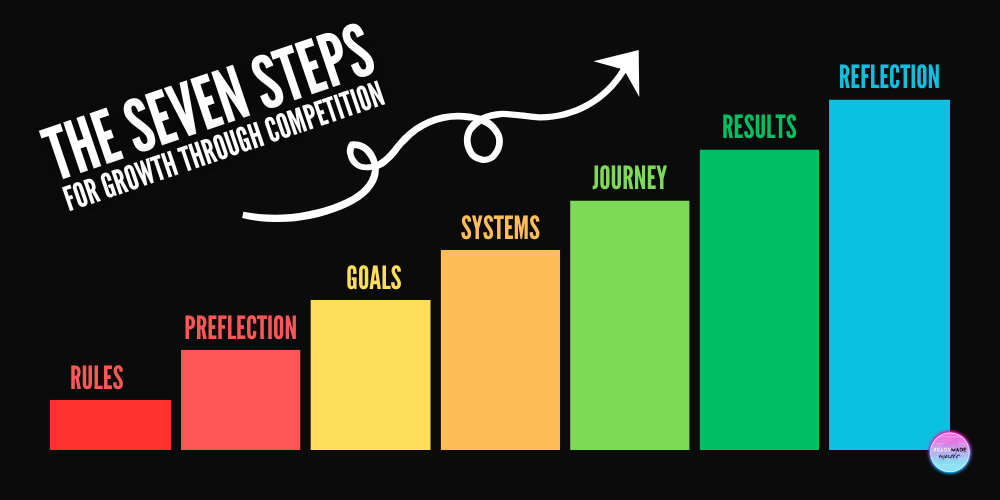
Step 1: The Rules
Every competition—marching contest, region audition, or science fair—has rules that must be understood. Cover the rules and discuss with your students:
- What is the particular competition?
- What does our participation look like?
- How will we be scored, measured, or ranked?
- How much time do we have to prepare for this competition?
Step 2: The Preflection
Next comes reflection before action—what I call preflection. Before setting new goals, students should examine their past results in the same or a similar contest. For example:
- What were your previous results?
- What do you wish you had done better last time?
- In what areas would you like to improve this time?
Step 3: The Goal-Setting
From there, guide your students to reasonable goals based on their true capabilities—not just emotion. Keep in mind, a goal that is too high will often result in frustration or abandonment of the goal, there’s a fine line between a goal that is challenging and one that is overwhelming. Questions to ask:
- Is this goal reasonable?
- Is it achievable?
- Why is this goal meaningful to you?
Step 4: The Systems
A goal without a plan is little more than hope—we need systems. Help your students design consistent systems such as practice schedules, rehearsal habits, mindsets, and accountability checks that support regular progress. Questions to ask:
- How many days a week will you need to practice?
- When is your best practice time?
- How long should each session be?
- What will you do if you miss a session?
- Who can you turn to for support when you feel overwhelmed or behind?
- What kind of attitude do you want to bring to practice?
- What other habits could help you succeed—like better sleep, healthier eating, or less time on social media or gaming?
Note: Children often struggle to set appropriate goals and systems because they misjudge their abilities and time—and create systems that are unsustainable. For this reason, I recommend having students write out their answers to the first four steps—especially the goal and systems—so you can review and guide them. For example, when preparing my students for All-Region auditions, I often dedicate a full class period to write out answers.
While writing this, I’m reminded of a last-chair trumpet player who set his goal to earn first in our highly competitive region. I encouraged him to set a more reasonable target—not because I didn’t believe in him, but because I knew that an unreachable goal could crush his motivation before real progress began. We adjusted to something still challenging yet attainable, and by the end of the season, he surpassed it. Sometimes, they need our help placing the bar high, but where they can still clear it.
Step 5: The Journey
Students are often unprepared for the emotional depth of the journey. At the start, they often romanticize the “win” without putting in the consistent effort. When they do start working, they often realize it’s much harder than they imagined.

Image credit: John Saddington
Before each new journey, I share a visual that helps prepare them for the inevitable “dark swamp” they’ll encounter. It gives them perspective—and comic relief. More than once, a student has come to me mid-season, overwhelmed, and I’ve asked with a smile, “Are you in the dark swamp of despair?” The question usually earns a grin or sigh, opening the door for an honest conversation about their next steps.
Step 6: The Results
Our results are mostly a culmination of our dedication to our systems and the quality of our efforts. Before results are announced, talk with students about what appropriate reactions look like. What does it mean to be respectfully joyful—or appropriately disappointed? And just as importantly, discuss how to handle failure, because there will always be some of that along the way.
Step 7: The Reflection
Once emotions have settled, reflection becomes one of the most valuable and overlooked parts of the process. Invite your students to think critically about what they learned by asking:
- Did you achieve your goal?
- Were your results consistent with your effort? If yes, how? If not, why?
- If you could go back to the start, what advice would you give yourself?
In my opinion, real growth happens when we reflect on our experience and what we learned and what we want to do differently next time.

It’s the Journey, Not the Destination
We all say, “It’s the journey, not the destination.” While this idea is easily understood, it can be very difficult to accept—especially when we’re emotionally tied to the outcome. Helping students see that what they learned along the way is more valuable than where they finished reframes the purpose of competing. The wisdom gained—the habits, resilience, experience, and perspective—will outlast any ranking.
It’s also worth acknowledging that not all competitors start from the same place. Skill development, resources, and support vary widely. Measuring growth by placement and rankings alone misses the full story. A better measure of success is the distance traveled—the space between who we were and who we’ve become.
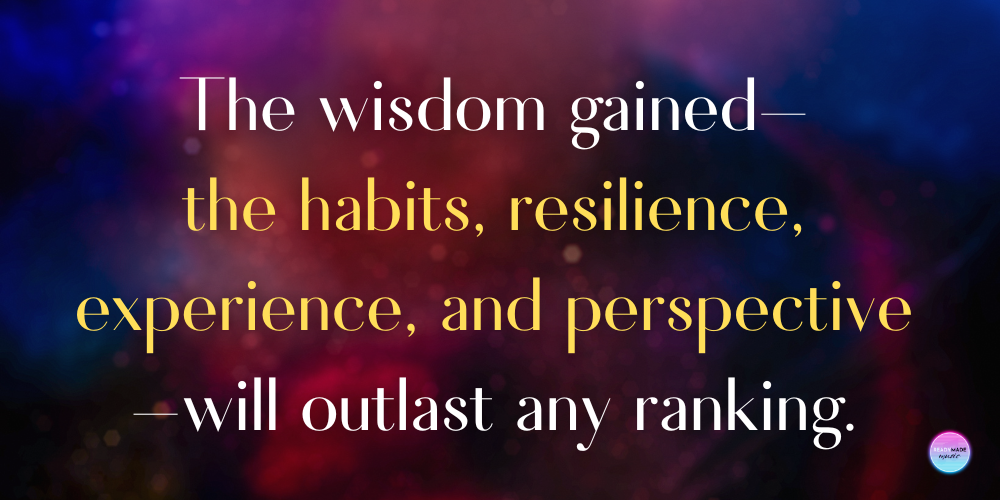
Beware of the Arrival Fallacy
There’s a subtle trap in all of this—the belief that once we achieve a certain goal, we’ll finally feel complete. Psychologists call it the arrival fallacy. It’s the mistaken belief that happiness is just on the other side of that next big goal, achievement, or recognition. The truth is that success can bring satisfaction, but the feeling fades. And when that happens, it’s easy to start chasing the next big thing to fill that emptiness.
That’s not to say we shouldn't push ourselves to achieve more with each new goal. Growth is healthy; obsession is not. Over the years, I’ve fallen victim to the arrival fallacy many times. My most profound realization was that by placing my happiness in future achievement, I was giving myself justification to ignore my lack of contentment with the present. In the back of my mind I was always thinking, “I’ll be happy when” instead of asking, “Why am I not happier now?”
When we base our happiness on future outcomes, we miss the opportunity to be mindful of the present and find contentment—a feeling of quiet happiness and satisfaction—in the process.
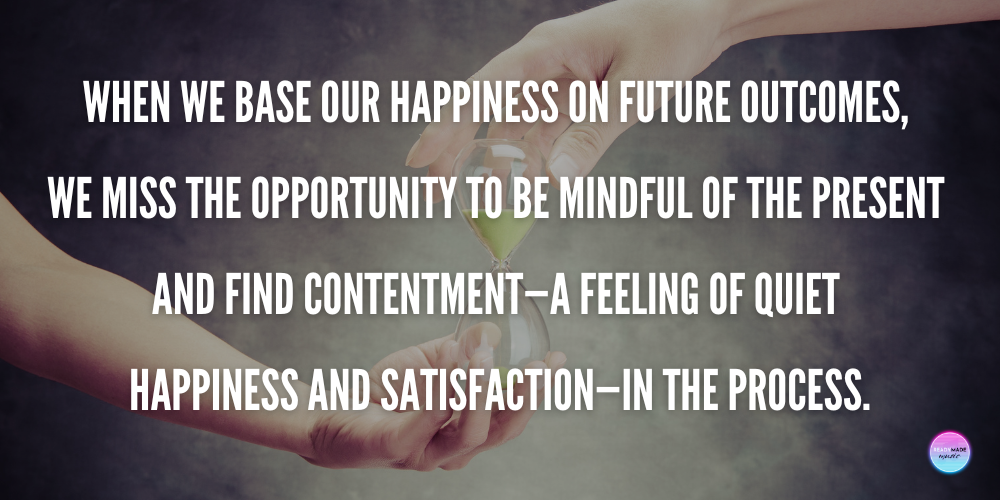
Check out music literacy method!
Final Thoughts
The most noble form of competition is the one we have with ourselves. When we compete against our former selves, every improvement is a win. Rankings fade, but personal progress endures.
If we are going to participate in ranked events, let’s approach them as opportunities to measure our work against the people and programs we respect—not to defeat them, but to learn from them. The healthiest kind of competition is one that draws inspiration from the excellence of others.
Suggested post:
Never miss a new posting!
Check out this short video!
About the author:

Rob Chilton is the creator and owner of Readymade Music, LLC and its content. Previously, Chilton was a middle school band director from 2007-2021. His most recent teaching position was the Head Band Director at Killian Middle School in Lewisville, Texas from 2014-2021.
Under his direction, the Killian Honors Band was named the 2018 Texas Music Educators Association CC Honor Band and performed at the annual 2018 TMEA Clinic/Convention. In 2019, the Killian Honors Band was invited to and performed at The Midwest Clinic in Chicago. Additionally, the Killian Honors Band was named a National Winner in the Mark of Excellence National Wind Band Honors Project in 2015, 2016, 2017, 2018, and 2019.
Chilton is a graduate of Southern Methodist University where he had the opportunity to study music education under the tutelage of Lynne Jackson and Brian Merrill. During his years as a middle school band director, Chilton continued his professional growth under the guidance of his primary clinicians, John Benzer and Brian Merrill.
Chilton’s mission for Readymade Music is to promote the overall well-being of music education and support school music teachers by providing solutions to help make teaching music more efficient and inspirational while increasing engagement for 21st century learners.

© 2023 Readymade Music, LLC
All rights reserved.
The unauthorized distribution and/or reproduction of this work is illegal.


